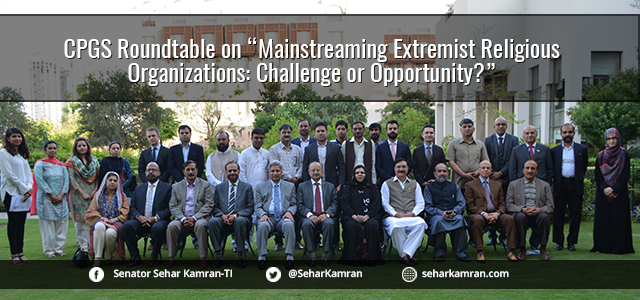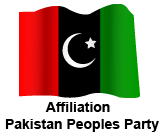‘The complex militant landscape of Pakistan poses a dilemma that requires a multi-pronged approach for a reintegration framework [..] We must revisit the implementation of NAP, and cater to the fundamental rights and need of our population to guard against extremism’ – Senator Sehar Kamran (TI)
 Islamabad, 8th May 2018: This was stated in the opening remarks by Senator Sehar Kamran, President of the Centre for Pakistan and Gulf Studies (CPGS) during a roundtable discussion on “Mainstreaming Extremist Religious Organizations: Challenge or Opportunity?” at Serena Hotel Islamabad on Tuesday, 8th May 2018. Speakers at the event included National Coordinator NACTA, Lt Cdr (Retd) Ihsan Ghani; Professor Dr Nazir Hussain, Director School of Politics and IR, Quaid-e-Azam University, and the session was chaired by Air Vice Marshal (Retd) Faaiz Amir HI(M) SBt. The discussion was organized by CPGS in collaboration with the German Foundation, Konrad Adenaur Stiftung (KAS).
Islamabad, 8th May 2018: This was stated in the opening remarks by Senator Sehar Kamran, President of the Centre for Pakistan and Gulf Studies (CPGS) during a roundtable discussion on “Mainstreaming Extremist Religious Organizations: Challenge or Opportunity?” at Serena Hotel Islamabad on Tuesday, 8th May 2018. Speakers at the event included National Coordinator NACTA, Lt Cdr (Retd) Ihsan Ghani; Professor Dr Nazir Hussain, Director School of Politics and IR, Quaid-e-Azam University, and the session was chaired by Air Vice Marshal (Retd) Faaiz Amir HI(M) SBt. The discussion was organized by CPGS in collaboration with the German Foundation, Konrad Adenaur Stiftung (KAS).
The discussion revolved around the mainstreaming of extremist religious organizations with possible militant links, the differences between reintegration and mainstreaming, as well as the impact of this phenomenon on the political, legal and socio-economic aspects of public life at large. It also delved into the dangerous precedents that had been set by the use of ‘street power’ by such groups to ‘threaten’ state institutions and challenge its jurisdiction/authority, in turn emboldening other fringe elements.
Senator Sehar Kamran (TI) highlighted how “violent extremism has posed one of the greatest threats in Pakistan’s history to its stability and prosperity. The two decades of the War on Terror had allowed the deadly instability along the borders to move inwards, distorting the very fabric of our society. It has taken a long and difficult struggle and great sacrifices from the people of Pakistan and its Armed Forces to reclaim this space from terrorists, but we continue to struggle with taking back the space that has become occupied by violent extremists and their narratives.” She opined that “the complexity of this issue is exacerbated by a multitude of extenuating factors, ranging from the broad religio-political spectrum in the country to our immense ethnic diversity. When the rights of the people are neglected, a vacuum is created, and violent extremist groups thrive in this vacuum. The social injustices and philanthropic activities by these groups further enhance their legitimacy among the masses as they present themselves as ‘messiahs’ for the people, and help them in narrative formation to gain attention and sympathy.”
Senator Kamran stated that “in the aftermath to Operations Rah-e-Raast, Zarb-e-Azb and Radd-ul-Fasad, some militant organizations have been seeking to move onto more legitimate political platforms, without altering or abandoning their demagogic ideologies, and dismissing the activities of their militant wings as irrelevant to their political messages, if owning them publicly at all. Domestically in Pakistan, voices remain divided over this ‘mainstreaming’ or ‘integration’ of violent extremist organizations into the fold of politics. It is also a fact that ideologically motivated proscribe organizations are unlikely to abandon their principal philosophies, and consequently the reintegration of banned outfits by allowing them political space without submission to the Constitution is simply not possible. Furthermore, a country faced with the sort of hybrid warfare that Pakistan has been facing, it is also important to consider the potential exploitation of these groups by hostile external parties to achieve their own goals.”
It is important to note that “Pakistan is signatory to numerous international laws that bar the inclusion of militants, militant organizations, violence, intolerance and discrimination in any form. Failure to adhere to our commitments under international law will adversely affect the state’s image and standing within the international community, and in turn, impact economic policies towards Pakistan,” she added.
Cmdr (retd) Ihsan Ghani, in his presentation, stated that ‘mainstreaming’ has the potential to be a constructive way of reforming and reorienting the current state of extremist religious organizations in Pakistan, but the political mainstreaming of these groups must not start without starting the de-radicalization process, as it would cause more damage to the political scene if not executed properly. He further highlighted that politicization without the de-radicalization process may perpetrate more violence, as these armed organizations may seek to intimidate political rivals and voters during electioneering. Consequently, it was important to first identify the stakeholders, start the process where these groups must voluntarily disarm, decommission and display their willingness to cooperate.
The organizations should who are willing to cooperate and disarm be allowed to operate, and recommended that the State must takeover the infrastructure and assets of these groups. He further said that their reorientation may cause a snowball effect, and others fringe groups may also follow suit. Nonetheless, he emphasized that a policy formulation process must start from the Parliament, and that the NACTA could play a critical role vis-à-vis mainstreaming, through its already developed policy instruments of NCEPG and National Narrative.
Professor Dr Nazir Hussain, in his remarks, said that ‘violence starts where an argument is no longer possible’. The core problem, he argued, lies in State policies, and without structural reform within the current political scene, the mainstreaming of religious elements will continue to pose a massive threat. He also highlighted that there also remains a threat of these religious parties being ‘hijacked’ by more savvy entities for their own ends. Dr Nazir also expressed his appreciation for the orders of the Supreme Court, under which the ECP would be scrutinizing all electoral candidates under Articles 62 and 63. He encouraged think-tanks and sub-state institutions like CPGS and the CII to put forward policy recommendations and questions for debate to the Parliament.
The panel also put forward a series of policy recommendations including:
- The Parliament must debate and formulate a policy that outlines the process aimed at bringing former militant elements into political stream.
- FATA needs to be mainstreamed as the first phase of this process.
- Resolve issues arising out of various armed conflicts.
- Implement all points of NAP.
- Include think-tanks and sub-state actors for policy guidelines.
The roundtable was attended by prominent dignitaries and practitioners, including H.E. Mr. Ahmed Fadel Yacoub, the Ambassador of Egypt, Mr Qibla Ayaz, Chairman Council of Islamic Ideology, diplomats from the US, Russia, France and Belgium, as well as by government officials, experts, academics, practitioners, and university students.


